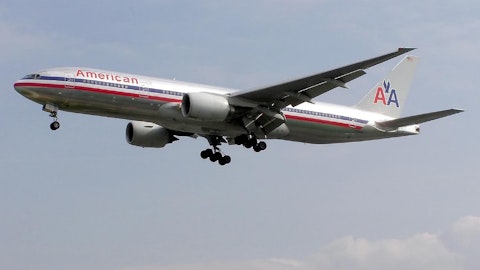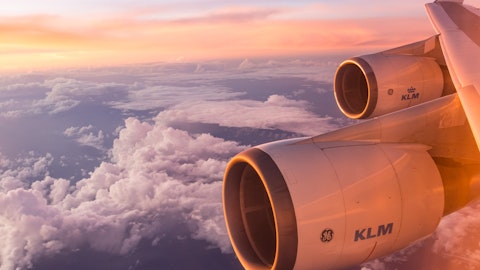We may well have to take aircraft churn aircraft out of Dublin. But Dublin is kind of exploited by coming up, and they’re looking for about a 17% cost increase over the next year or two in passenger charges. So airports like that, that are badly run badly managed and are inflating on justifying the inflating cost, we’ll see I think we’ve churned some capacity out of places like Dublin and put them into other much more growth incentive markets like Spain, Italy, across Central Europe at the moment in Poland, Romania, Slovakia, Czech Republic, the Baltic states, we’re seeing ambitious airports putting in place very enlightened discount schemes for growth, Morocco, as Eddie said, Albania are going to be areas of significance. So there will be more churn in our business over those couple of years.
And I think that’s good for the business. It keeps us on our feet, it will keep us aggressive and it will also help us to keep — put pressure on mismanaged airports like Dublin, who continue to exploit the regulatory regime to unjustifiably increased comp at a time where they should be lowering fees and trying to drive growth. Next question Maxi.
Operator: The next question comes from Muneeba Kayani from Bank of America. Please go ahead Muneeba, your line is now open.
Muneeba Kayani: Two follow-up questions, please. The first one, just on the dividend for this year. Can you talk about why you have a EUR400 million dividend instead of a payout for fiscal 2024. And just to clarify, so in the scenario that you think there is surplus cash, could there be a specialty or share buyback even for next year? That’s the first question. And then secondly, on your pricing comments for fiscal 3Q, do you think that your pricing trends are better than the overall market? Do you think the market is also seeing similar mid-teen pricing and/or you’re benefiting from the trade down that you talked about earlier? Thank you.
Michael O’Leary: Okay. Dividend this year for EUR400 million. Well, if we paid out 25% of last year’s profits [indiscernible], it would have been about EUR350 million, EUR360 million. And the Board felt that it sent a strong signal to the market and also to shareholders. But if we rounded that up to EUR400 million, it would repay the shareholders, including myself, I might add who put her hands in our pockets during the depth of COVID and invested EUR400 million at a time when nobody was able to raise equity in the airline industry. And I think that’s an effective signal. The shareholders who stood by us during COVID and who wrote those difficult checks during the very difficult COVID period are seeing that return. Is there a prospect of special dividends or share buybacks next year.
I mean the answer is yes, but it all depends on trading. It all depends on how the cash flows develop. And it will depend on what the Board decides to do. I mean we will continue to be conservative and judicious, but you have our assurance is that excess cash will be returned to shareholders whenever we’re confident that we can meet our payroll commitment, our debt repayment commitment and our CapEx commitment. Do I think Q3 will be better than the overall market? Yes. I think what’s driving the overall market across Europe is very aggressive price increases by Lufthansa, Air France-KLM, IAG, easyJet and others and they’re all pricing materially above Ryanair, and average airfares are in the case of easyJet double Ryanair in the case of the legacy, they’re 3, 4, 5 times higher than ours.
And if they’re going up, seeing average fares rise by a high single digit this winter and I think they are because of the capacity constraints. They are driving more and more people, more and more customers and their families in the direction of Ryanair taking low fare air travel, and we’re seeing strong forward bookings and strong pricing. And I think that’s why off a much lower base we’re seeing a strong and I think that would continue off a much lower base. We see stronger pricing in the Ryanair model as Europe consolidates or continues to consolidate over the next through two, three, four years as capacity continues to be materially constrained. And I think in the summer 2024, as many of our competitors will be grounding aircraft because they know probably with the engines operate them.
I don’t know, Eddie, you want to add anything on the Q3 better than the overall market?
Edward Wilson: Not really. I think you sort of covered it off there. I mean like it’s what we’ve seen before where I hate to use the phrase but sort of trade down. But as people become more price sensitive, they — I think you’re quite wise on what you’re saying, that migration of people. And in a lot of cases, given our size and scale, we have more frequencies and two more airports as well. That gives us that a little bit extra, I suppose, in terms of uplift. Yes, nothing really to add on that.
Michael O’Leary: Yes. I continue to be amazed. I mean the amount of the handwringing going on, particularly in the analyst community, consumers under pressure, and they are under pressure, speaking very frankly. People don’t stop flying. In other sectors, people trade down to little and all the — they buy their furniture in IKEA not in some department store. And as there are very strong performance over the last two years, and we’re now carrying 22%, 23% more traffic than we did pre-COVID in an industry across Europe, that’s operating at about 94% pre-COVID capacity. People are trading to the lowest cost provider, which in every market in Europe is Ryanair. We’re also happen to be probably the best on-time performance. So we’re delivering great service at lower prices.
We’re now doing that on aircraft like the Boeing MAX where we can carry more passengers but burning less fuel and delivering very material operating cost efficiency. So I think this is now a time for our expansion. We were desperately working with Boeing to try to get as many of those 57 aircraft we can in time of December 2024 because if we don’t keep that expansion going, then consumers across Europe really will be screwed by the Lufthansa, Air France and the high fare national champion, all of whom received billions of subsidies during COVID from Europe taxpayers and they’re — and gratitude [indiscernible] scalping those taxpayers for extraordinary eyewatering airfares. Next question please.
Operator: The next question comes from Sathish Sivakumar from Citi. Please go ahead your line is now open.
Sathish Sivakumar: I got two questions here. So firstly, on the forward booking and you pointed out that saying it’s actually much better than last year. How does it like evolved as we went into this quarter for the Christmas period as well as into the Easter next year. And then the second one, any update on the potential risk from the Italian government on the price gap, that will be helpful. Thank you.
Michael O’Leary: I missed — I didn’t get the second half of that, Sathish. I got the first half, I’ll deal with. Look, we see, at the moment, all of the forward bookings into the Christmas is strong, the February school midterm break. Ski is running, bookings and fares are running ahead of the prior year, and we have the first half of Easter in the last week of March. So I think we remain reasonably optimistic on pricing for the second half of the year and into Q4, although we always have to qualify that we have availability to Q4 visibility. And I didn’t get the second half of the question, if Neil or Eddie did, please feel free to answer it.
Neil Sorahan: Yes, we might get Juliusz because he wants to answer this one on the price cap.
Juliusz Komorek: Sathish, on the pricing I think I got your question, but you can correct me if I answer a different one. I think we’ve had pretty much pricing in Europe guaranteed an EU law since 1997 and all governments recognize that it’s there and that it’s an integral part of the success that European Aviation has enjoyed over the last nearly four decades. What the Italian government has done over the summer, I would not take it too seriously as a serious well-considered step. It was part of a decree, which was passed, I think, on the last day before the government checked out for the summer break. At the same decree talked about a tax on Italian banks, which the government then had to walk back from and some measures about the taxi industry, which apparently is a mass in Italy today.



